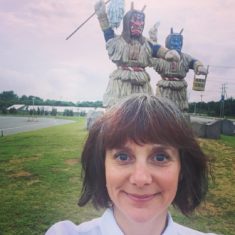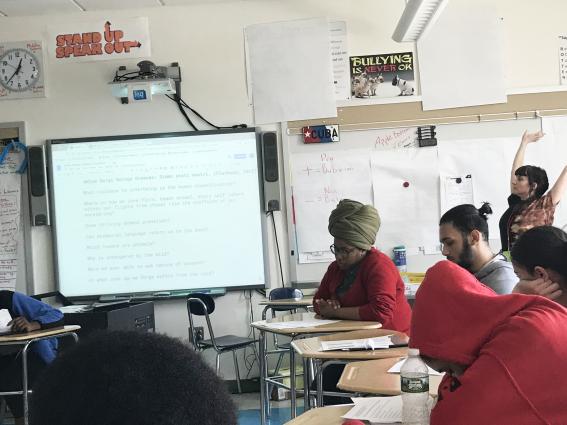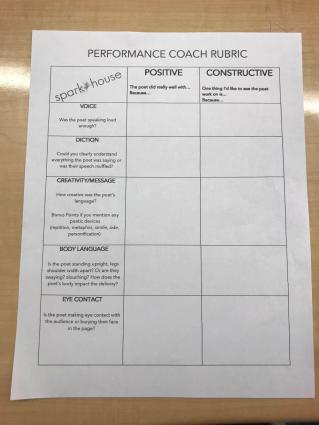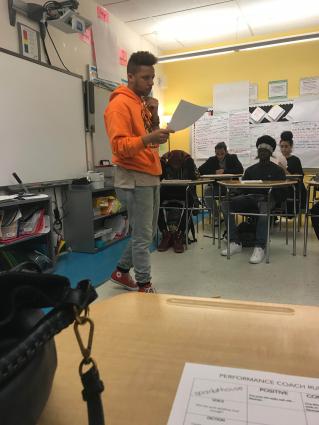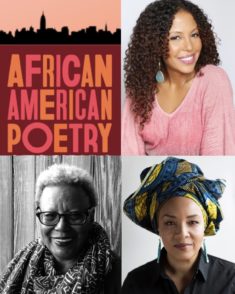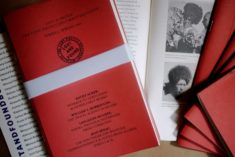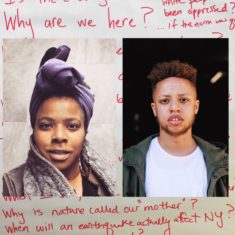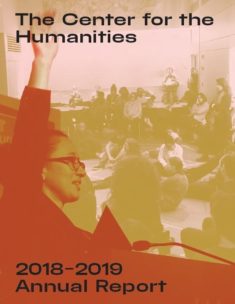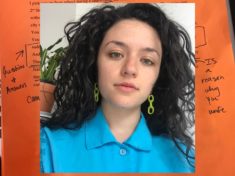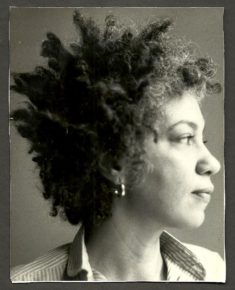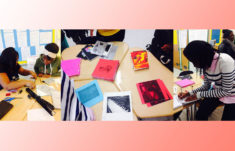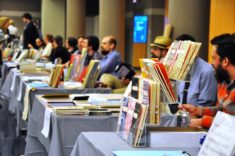About the Project
As part of the Center for The Humanities’ enduring work to bridge together various educational communities and making CUNY spaces and resources available to our surrounding public and potential future CUNY students, we have fostered an ongoing collaboration with poet and educator Alex Cuff and Raven Press.
Raven Press, run out of the Academy for Young Writers in Brooklyn, is a feminist press led by Alex Cuff, run by high school students, and open to students in grades 6 through 12. Together, they work as a collective publishing poetry, non-fiction, and fiction that addresses the diverse concerns of their direct peers. The program, which meets as an elective during the school day as well as an after-school club, creates a space for writing while cultivating leadership and confidence among students who author, edit, design, and publish their own chapbooks. Through creative and professional workshops, poets and publishers provide mentorship for Raven Press. In addition to publishing individual chapbooks, Raven Press has published their second anthology, Young Writers Speak Out!—a collection of work that specifically addresses change students want to see in the world, in particular as a response to the election.
Our collaborative work with the dedicated young editors of Raven Press and Cuff has branched into a series of events centered around writing, self-publishing, the ways voices of younger writers are received, as well as the ability for those existing within marginalized communities and identities to take their narratives into their own hands, rather than be spoken for or spoken over by a canon dominated by white male voices. This work began in 2015 with the 7th iteration of the New York Chapbook Festival. The Chapbook Festival celebrated the chapbook as a work of art and as a medium for alternative and emerging writers and publishers. This was the perfect avenue for the writers in Raven Press to not only share their work with a wider New York audience but to see just how far the possibilities of the chapbook as a medium extend.
At their panel Raven Press Redux: Chapbook Publishing as a Pedagogical Tool, the founders of Raven Press, represented by Chris Bardales, Kari Henry, Jessica Michel, Lynette Smith, Ashaunte Solomon, and Tianna Wells, prepared for writing and life after high school, while also training the next generation of teenage publishers to take the helm of their press. The discussion at this panel built off of a series of questions that remain at the core of Raven Press and their mission as writers and small-publishers. “How do self-expression and self-publication inspire community-building and inform a sense of personal efficacy?” “If we produce and distribute our own chapbooks, pamphlets, poetry, fiction, and nonfiction, are we taking charge of our own stories? Our own lives?”
Raven Press Redux: Chapbook Publishing as a Pedagogical Tool begins at 3:08:54
Through this event our connections with both Cave Canem and Raven Press were strengthened even further. In April 2017, we were able to pick up where Raven Press Redux: Chapbook Publishing as a Pedagogical Tool left off in the form of a day long workshop held at the Center For The Humanities. The Power of Publishing! opened with a panel discussion where guest poets and educators Mirene Arsanios, Mahogany L. Browne, Farnoosh Fathi, Adjua Greaves, Zakia Henderson-Brown, Zohra Saed, Nicole Sealey, and Diamond Sharp departed anecdotes and tips for the young writers looking to break through into the world of professional writing and publishing. The discussion between panelists and students from Raven Press as well as Bard High School students—who had been able to attend thanks to an open invitation to teachers and their students via the Center as well as the connections made through panelists and their communities—centered around this advice as well as around the challenges of getting published or working in a field that has historically privileged white and/or male perspectives, and the ways self-publication can inspire community-building, creating agency in individuals and communities who wish to take charge of their own stories.
The Power of Publishing! ended with an open mic session where students shared both the writing produced during the workshop portion of the day as well as their ongoing work in poetry, prose, song, and playwriting. Feeding off of one another’s energy the students encouraged each other, listened intently, and gave their praises to one another. Students from different high schools even ended up trading contact information to keep in touch after the event.
For the past two years the Center for the Humanities has provided funding for the Cave Canem Cornelius Eady Chapbook Prize. For the 2018 prize we were able to collaborate with Raven Press on the celebration and launch of prize winner Layla Benitez-James’ chapbook “God Suspected My Heart Was a Geode But he Had To Make Sure.” Myckaela Wharton of Raven Press moderated a conversation between Benitez-James and prize judge Major Jackson following a reading by the two. This was Myckaela’s first time as a moderator—an occasion which she met with immeasurable poise, equipped with insightful questions focused on the themes of “God Suspected My Heart Was a Geode But He Had to Make Sure” and what drew Jackson so closely into the work. The conversation generated gave the audience an even deeper look into the poems they had just heard.
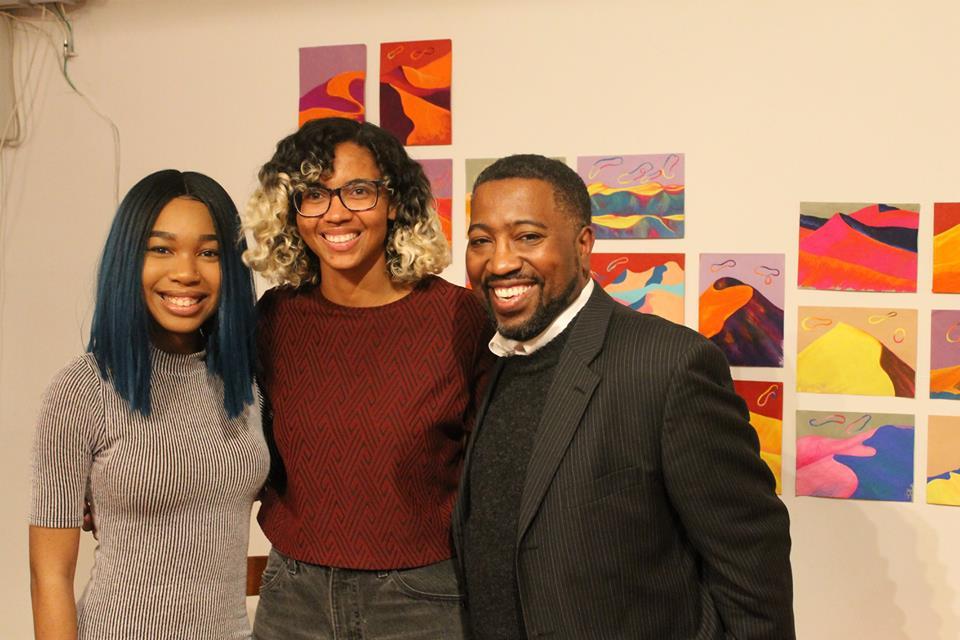
In Spring 2018 we worked with Cuff and her Writers’ Lab class at the Academy For Young Writers to hold a series of four poet-led workshops focusing on fostering an interest in writing and aiding the development of poetic skills learned throughout the semester. This semester’s Writers Lab, “The Poetics of Liberation” was themed around a celebration of identity—an exploration of the intersections that make us powerful, individual, and beautiful. The class explored these topics through a black futurist lens, one of the main books of focus being Eve L. Ewing’s Electric Arches. The workshops, led by poets Adjua Greaves and Najee Omar, provided an opportunity for deeper exploration of what it means to find power in identity and its intersections, and gave students an open space to create and polish original works of writing under the guidance and support of professional teacher-poets based in New York City.
The workshops not only generated student writing, but also helped prepare them for their first poetry reading—an event organized by Cuff as an end-of-unit celebration of the students’ work. The workshops also exposed students to different styles of poetry, and creative methods for expressing their thoughts, identities, and desires for their future through their writing and brought them closer to a poetry community they hadn’t realized existed nor had space for them.
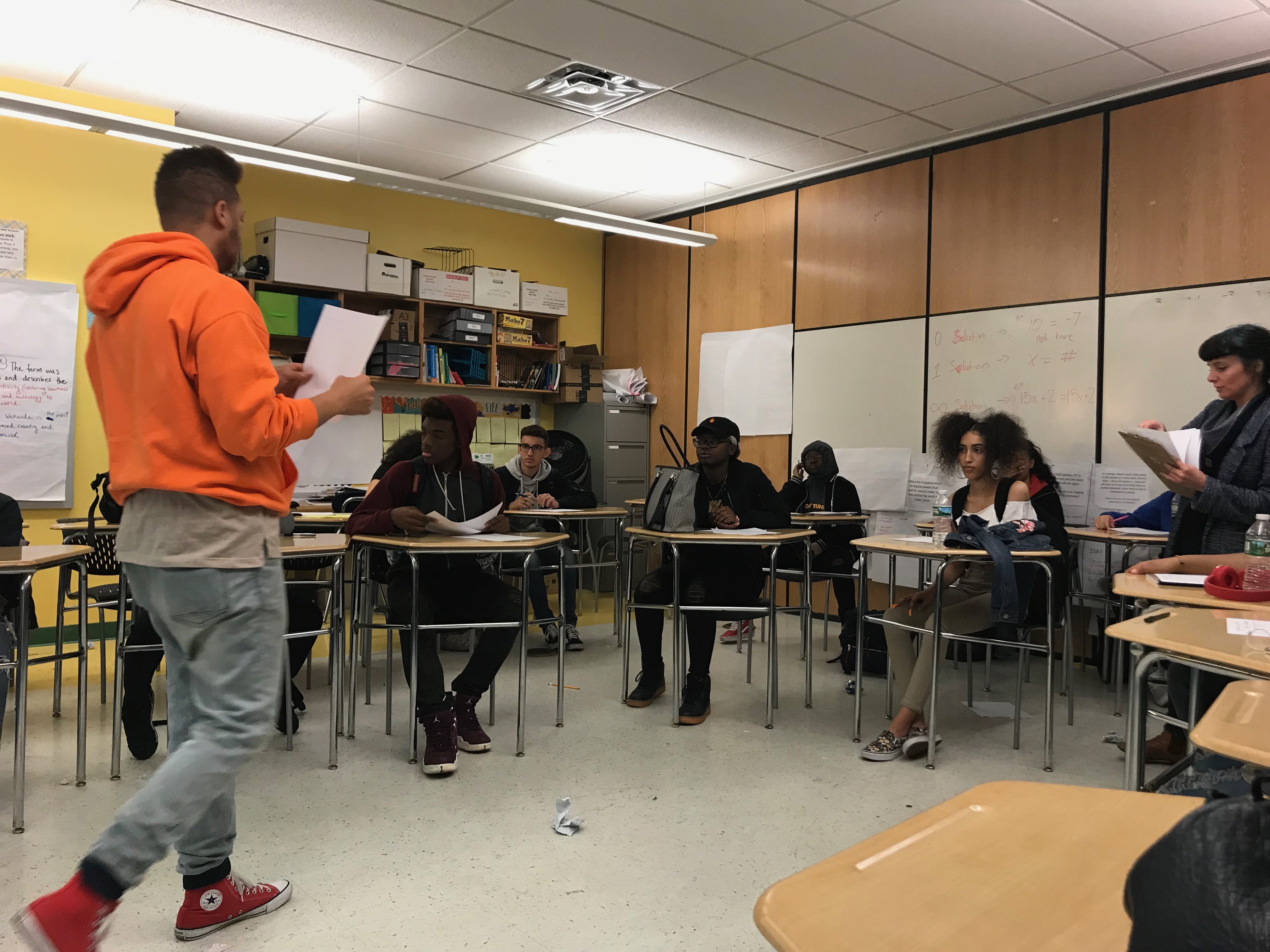
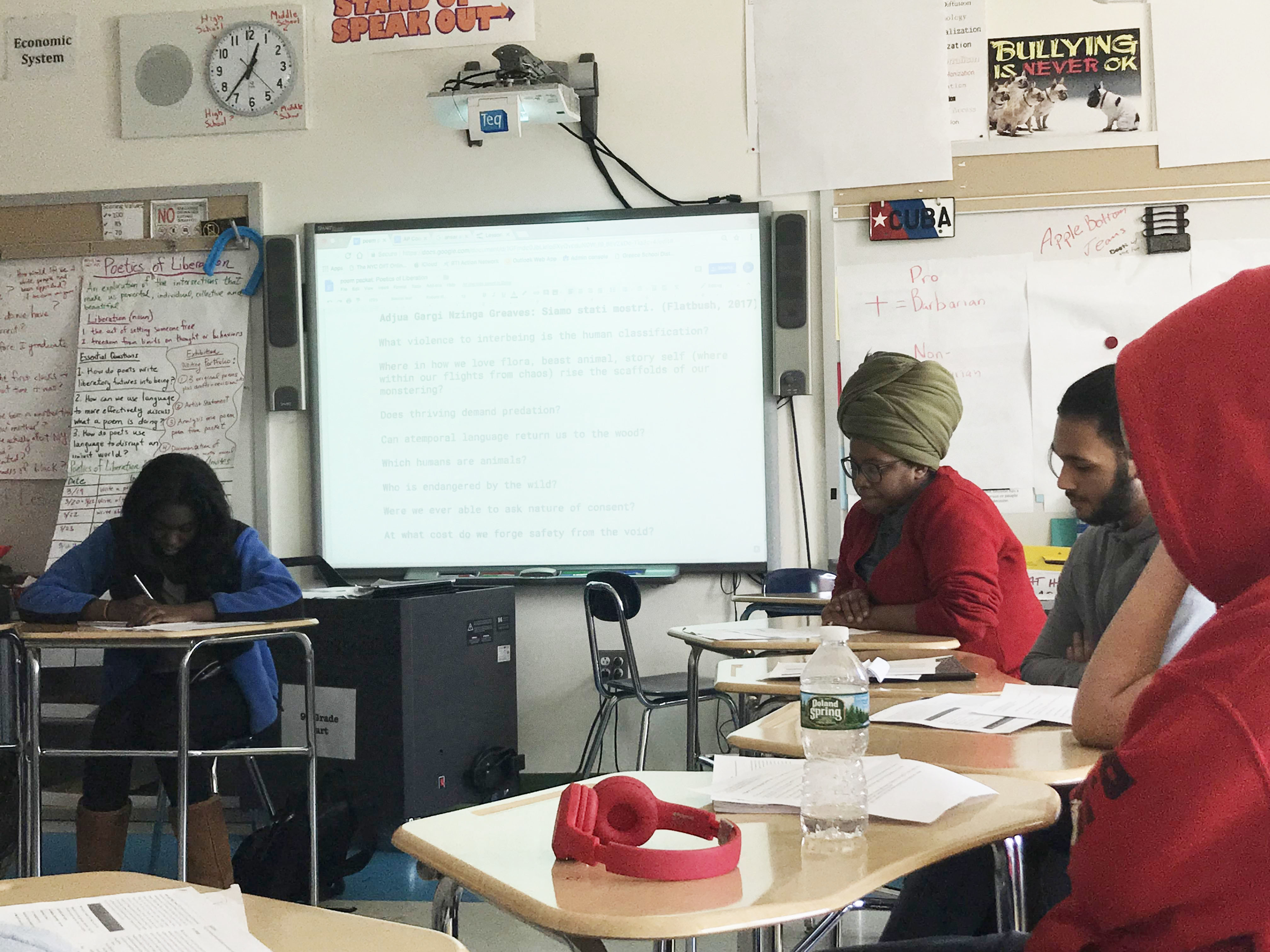
Another major outcome of the Center’s ongoing collaborative work with raven Press and Cave Canem manifested in A Tribute to June Jordan, a day-long intergenerational exploration of the legendary teacher, activist, and poet’s life, work, and legacy. The day featured panels, lectures, discussions and readings centered on Jordan’s work in liberatory pedagogy, building literary communities, inclusivity and accessibility, and how the June Jordan Reader can carry us into new forms of revolution.
The conference, while holding Jordan’s legacy of work at its focus, still carried the spirit and lines of questioning put forth by Raven Press and their mission. This in turn has solidified an initiative to bring recent Lost & Found publication, June Jordan: “Life Studies” 1966-1976, into both high school and college classrooms.
Events in this project have been co-sponsored by Raven Press, Lost & Found: The CUNY Poetics Document Initiative, the Center for the Humanities at the Graduate Center, CUNYthe Cave Canem Foundation, Berl’s Brooklyn Poetry Shop, the Academy of American Poets, the Center for Book Arts, the Council of Literary Magazines and Presses, CUNY MFA Affiliation Group, CUNY Office of Academic Affairs, The New York Public Library, the Poetry Project, the Poetry Society of America, Poets House, Poets & Writers, the June M. Jordan Literary Estate Trust, the Institute for Research on the African Diaspora in the Americas and the Caribbean (IRADAC), The Feminist Press at CUNY, and HarperCollins Publishers.
These projects have been spearheaded by Alex Cuff, Nicole Sealey, Kendra Sullivan and Stephon Lawrence.
